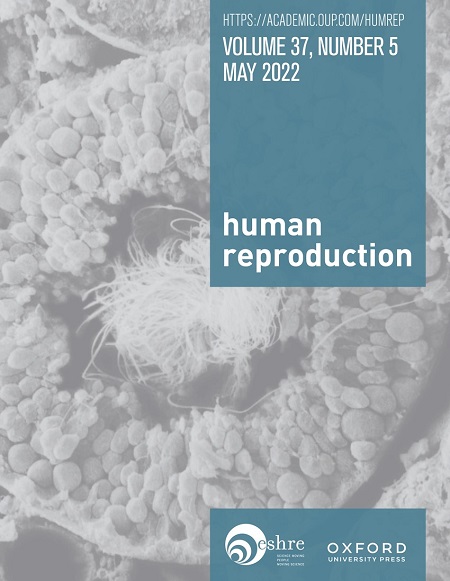COVID-19 vaccination and pregnancy-induced hypertension risk in women undergoing assisted reproduction.
IF 6
1区 医学
Q1 OBSTETRICS & GYNECOLOGY
引用次数: 0
Abstract
STUDY QUESTION Does COVID-19 vaccination affect the risk of pregnancy-induced hypertension (PIH) in women undergoing ARTs, and does this risk differ based on vaccine type (inactivated vs recombinant) and timing relative to embryo transfer? SUMMARY ANSWER Women who received inactivated COVID-19 vaccines before undergoing ART had a significantly increased risk of developing PIH, particularly when vaccinated with two or more doses or when embryo transfer occurred within 1 month of vaccination. WHAT IS KNOWN ALREADY COVID-19 vaccination during pregnancy reduces the risk of severe COVID-19 illness with no significant safety concerns for the mother or fetus. PIH is a common complication in ART pregnancies, particularly in older women and those with higher BMI, but the effects of different COVID-19 vaccine types on PIH risk in ART pregnancies remain unclear. STUDY DESIGN, SIZE, DURATION A retrospective cohort study analyzing 3911 women undergoing ART after receiving COVID-19 vaccines. The study period spanned from 1 December 2020 to 30 September 2022. PARTICIPANTS/MATERIALS, SETTING, METHODS Participants were categorized based on COVID-19 vaccination status, vaccine type (inactivated vs recombinant), and the timing of vaccination relative to embryo transfer. The primary outcome was the development of PIH. Multivariate robust Poisson regression was used to assess the association between vaccination and PIH, while subgroup analyses explored the risk across variables like age, BMI, and embryo transfer type. MAIN RESULTS AND THE ROLE OF CHANCE Women vaccinated with an inactivated COVID-19 vaccine prior to embryo transfer had a significantly higher incidence of PIH compared to unvaccinated counterparts (relative risk [RR] = 1.45; 95% CI 1.10-1.92; P = 0.009). In contrast, recombinant vaccines did not show a significant association with increased PIH risk (RR = 1.19; 95% CI 0.69-2.05; P = 0.537). The risk was particularly pronounced among women receiving two or more doses of the inactivated vaccines and those who had embryo transfers within 1 month of vaccination. Subgroup analyses showed elevated PIH risk in women aged ≥30 years old, those with BMI ≥22 kg/m2, individuals with secondary infertility, and those undergoing cleavage-stage or fresh embryo transfers. LIMITATIONS, REASONS FOR CAUTION The study's retrospective design limits causal inference. The sample is from a single ethnic background, and familial hypertension history was not available, potentially introducing residual confounding. WIDER IMPLICATIONS OF THE FINDINGS The study suggests that the type and timing of COVID-19 vaccination may influence PIH risk in ART pregnancies. These findings underscore the need for careful consideration of vaccination type and timing in ART protocols and highlight the importance of further prospective studies to validate these results before influencing clinical decision-making. STUDY FUNDING/COMPETING INTEREST(S) This work was supported by the Hunan High-Level Talent Aggregation Project [2022RC4007]; the National Natural Science Foundation of China [72004148]; the Hunan Provincial Enterprise Joint Fund [2024JJ9093]; the Hunan Provincial Grant for Innovative Province Construction [2019SK4012]; the Deutschlandstipendium of the Charite; the non-restricted research grant of Boehringer Ingelheim Ltd.; and the Research Grant of CITIC-Xiangya [YNXM-202304, 202217]. The authors report no conflicts of interest. TRIAL REGISTRATION NUMBER N/A.辅助生殖妇女的COVID-19疫苗接种和妊娠高血压风险
研究问题:COVID-19疫苗接种是否会影响接受抗逆转录病毒治疗的妇女发生妊娠性高血压(PIH)的风险,这种风险是否因疫苗类型(灭活疫苗与重组疫苗)和胚胎移植的时机而有所不同?在接受抗逆转录病毒治疗前接种过COVID-19灭活疫苗的妇女发生PIH的风险显著增加,特别是接种两剂或两剂以上疫苗或在接种后1个月内进行胚胎移植的妇女。怀孕期间接种COVID-19疫苗可降低严重COVID-19疾病的风险,对母亲或胎儿没有重大安全问题。PIH是抗逆转录病毒治疗妊娠的常见并发症,特别是在老年妇女和BMI较高的妇女中,但不同的COVID-19疫苗类型对抗逆转录病毒治疗妊娠中PIH风险的影响尚不清楚。研究设计、规模、持续时间一项回顾性队列研究,分析了3911名接受COVID-19疫苗后接受抗逆转录病毒治疗的妇女。研究期间为2020年12月1日至2022年9月30日。参与者/材料、环境、方法根据COVID-19疫苗接种状况、疫苗类型(灭活疫苗还是重组疫苗)以及接种时间相对于胚胎移植对参与者进行分类。主要结果是PIH的发展。多变量稳健泊松回归用于评估疫苗接种与PIH之间的关系,而亚组分析则探讨了年龄、BMI和胚胎移植类型等变量的风险。主要结果和机会的作用胚胎移植前接种了COVID-19灭活疫苗的妇女与未接种疫苗的妇女相比,PIH的发生率显著高于未接种疫苗的妇女(相对风险[RR] = 1.45;95% ci 1.10-1.92;p = 0.009)。相比之下,重组疫苗没有显示出与PIH风险增加的显著关联(RR = 1.19;95% ci 0.69-2.05;p = 0.537)。在接受两剂或两剂以上灭活疫苗的妇女和在接种疫苗后1个月内进行胚胎移植的妇女中,这种风险尤其明显。亚组分析显示,年龄≥30岁、BMI≥22 kg/m2、继发性不孕症、卵裂期或新鲜胚胎移植的妇女发生PIH的风险升高。局限性,谨慎的原因本研究的回顾性设计限制了因果推理。样本来自单一种族背景,没有家族高血压病史,可能会引入残留混淆。研究结果的更广泛意义该研究表明,COVID-19疫苗接种的类型和时间可能会影响ART妊娠的PIH风险。这些发现强调了在抗逆转录病毒治疗方案中仔细考虑疫苗接种类型和时间的必要性,并强调了在影响临床决策之前进行进一步前瞻性研究以验证这些结果的重要性。研究经费/竞争利益(S)本研究由湖南省高层次人才聚集项目[2022RC4007]资助;国家自然科学基金[72004148];湖南省企业联合基金[2024JJ9093];湖南省创新省建设专项基金[2019SK4012];慈善基金会的德国津贴;勃林格殷格翰有限公司的非限制性研究经费;中信祥雅研究基金[YNXM-202304, 202217]。作者报告没有利益冲突。试验注册号/ a。
本文章由计算机程序翻译,如有差异,请以英文原文为准。
求助全文
约1分钟内获得全文
求助全文
来源期刊

Human reproduction
医学-妇产科学
CiteScore
10.90
自引率
6.60%
发文量
1369
审稿时长
1 months
期刊介绍:
Human Reproduction features full-length, peer-reviewed papers reporting original research, concise clinical case reports, as well as opinions and debates on topical issues.
Papers published cover the clinical science and medical aspects of reproductive physiology, pathology and endocrinology; including andrology, gonad function, gametogenesis, fertilization, embryo development, implantation, early pregnancy, genetics, genetic diagnosis, oncology, infectious disease, surgery, contraception, infertility treatment, psychology, ethics and social issues.
 求助内容:
求助内容: 应助结果提醒方式:
应助结果提醒方式:


